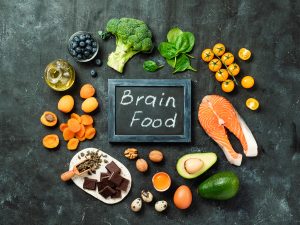 The brain is the command center of the body. It processes information and sends messages controlling everything your body does from thoughts and emotions to memory and motor skills.
The brain is the command center of the body. It processes information and sends messages controlling everything your body does from thoughts and emotions to memory and motor skills.
As we age, the brain experiences physiological changes that affect memory, focus, and word recall. Fortunately, we can combat some of these changes with our diet, which plays a major role in keeping our minds sharp and maintaining our mental function.
Brain foods are foods that can benefit brain health. They contain various nutrients that keep the brain functioning well. They include:
- Omega-3 fatty acids
- B vitamins
- Vitamin E
- Vitamin C
- Vitamin K
- Selenium
- Iron
- Choline
Eating a diet rich in these nutrients can help fight off common brain-related conditions and symptoms often associated with age. These nutrients may help with:
- Brain development
- Proper signaling of neurotransmitters
- Processing and understanding new information
- Memory
- Protein balance
- Reducing the risk of brain-related conditions linked to inflammation, such as depression and dementia
Here are 15 foods to add to your diet that are rich in essential nutrients:
- Eggs
- Fatty fish
- Berries such as blueberries, raspberries, and strawberries
- Broccoli
- Mushrooms
- Walnuts
- Turmeric
- Coffee
- Leafy greens
- Green tea
- Dark chocolate
- Fermented dairy
- Avocados
- Certain fruit juices such as pomegranate, grape, and cherry juice
- Whole grains
Remember, no food on its own will magically transform your brain. However, eating brain foods regularly can keep your brain sharp and maintain your cognitive ability as you age. Maintaining an overall healthy eating pattern is important to reap the health benefits of these nutrient-rich foods.
All content of this newsletter is intended for general information purposes only and is not intended or implied to be a substitute for professional medical advice, diagnosis or treatment. Please consult a medical professional before adopting any of the suggestions on this page. You must never disregard professional medical advice or delay seeking medical treatment based upon any content of this newsletter. PROMPTLY CONSULT YOUR PHYSICIAN OR CALL 911 IF YOU BELIEVE YOU HAVE A MEDICAL EMERGENCY.
